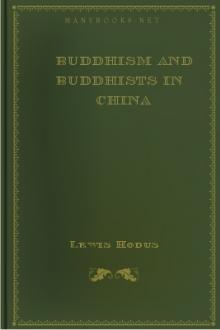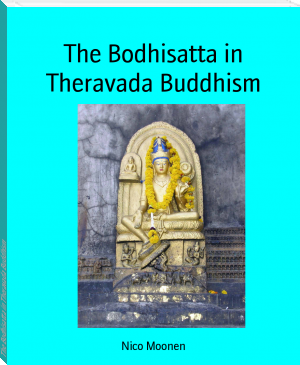Buddhism and Buddhists in China - Lewis Hodous (top ten books of all time txt) 📗

- Author: Lewis Hodous
- Performer: -
Book online «Buddhism and Buddhists in China - Lewis Hodous (top ten books of all time txt) 📗». Author Lewis Hodous
The hillsides are dotted with numerous temples and shrines. There is one to Chu-Hsi, the great philosopher of the Sung dynasty, who was born in Fukien. In it are preserved a few characters indited by his hand. On the west side of the monastery are large buildings for the housing of animals released by merit-seeking devotees. Here cows, hogs, goats, chickens, geese and ducks spend their old age without fear of beginning their transmigration by forming the main portion of a Chinese feast.
The monastery is governed by an abbot, usually a man of good business ability, elected by the monks. Under him are the officers of the two wings or groups of attendants. One set looks after the spiritual interests, of the monks; the-other takes care of their material needs: The monks have worship about two o’clock in the morning and again at about four in the afternoon. The rest of the long day they spend in meditation, or study, in strolling about the mountain side or in sleep. Their life is separated from all stirring contact with the life of the world.
2. Monasteries Control F�ng-shui
This monastery with its appointments is a good type of the monasteries all over China. It was founded at the request of the inhabitants of the neighborhood, because the dragons of the region used to cause much damage to the crops in the surrounding country. A holy monk came, founded the monastery, and by his good influence so curbed the dragons that the country-side has enjoyed peace ever since and the monastery has prospered. Since the fourth century of our era records show that by the building of monasteries in strategic place’s holy monks brought rains and prosperity to various regions, or prevented floods and calamities from damaging the villages. In other words the monasteries are regarded as the controllers of f�ng-shui (wind and water). According to the Chinese philosophy winds and water are spiritual forces and may be so controlled by other spiritual forces that instead of bringing harm they will confer benefit upon the people. Floods and dry seasons are so frequent in China that any institution holding out the promise of regulating them would become firmly established in the affection of the people. The monasteries have taken this place.
One of the picturesque features of a Chinese landscape is the pagoda. These structures were introduced in the early stages of Buddhism to enshrine the relics of Buddha. It was said that Buddha’s body consisted of eighty thousand parts, hence numerous pagodas were erected to shelter these relics. Inasmuch as a pagoda contained the relics of Buddha, it possessed magic power and so came to play a great part in the control of the winds and the rains. The pagoda in China has an odd number of stories varying from three to thirteen. The odd numbers belong to the positive principle in nature which is superior to the negative principle. The pagoda plays quite a part in the festivals of the people. On certain occasions the stories are hung with lanterns and the pagodas are visited by numerous throngs.
3. Prayer for RainPrayers for rain afford such a common illustration of the relation of Buddhism to the life of the peasant that a detailed presentation of such a service may be of seal value.
During a prolonged drought in some district of China, when the heat opens gaping cracks in the fields and the grain is drying up, the populace may visit their highest official and apprise him of the dire situation. He often forbids the slaughter of all animals for three days and, in case rain has not thereby come, he goes in person or sends a deputy to the nearest monastery to direct the monks to pray for rain.
(a) The Altar.—On such an occasion the great hall of the Law may be used for the ceremony. Quite often a special altar is erected in an enclosure near the monastery on a platform one foot high and twenty-five feet on each side, overspread by a tent of green cloth. In the center seats are arranged for the presiding monk and his assistants. On each of the four sides of the altar is placed an image of the Dragon King who is supposed to control the rain. If an image is not obtainable a piece of paper inscribed with the name of the dragon may be used. Flowers, fruits and incense are spread before the images. On the doors of the tent are painted dragons with clouds. The tent and altar are green and the monks wear green garments, because green belongs to the spring and suggests rain. For this ceremony the monks prepare themselves by abstinence and cleansing. The presiding monk is one of high moral character and religious fervor. While some monks recite appropriate sutras, two others look after the offerings, the incense, and the sprinkling of water during the ceremony to suggest the coming of rain. The services continue day and night, being conducted by groups of monks in succession.
(b) The Prayer Service.—The ceremonial is opened by a chant as follows:
“Pearly dew of the jade heavens, golden waves of Buddha’s ocean, scatter the lotus flowers on a thousand thousand worlds of suffering, that the heart of mercy may wash away great calamity, that a drop may become a flood, that a drop may purify mountains and rivers.
“We put our trust in the Bodhisattvas and Mah�sattvas that purify the earth.”
The chant ended, a monk takes a bowl of water and repeats thrice: “We put our trust in the great merciful Kuan Yin Bodhisattva.” Then follows the chant:
“The Bodhisattva’s sweet dew of the willow is able to make one drop spread over the ten directions. It washes away the rank odors and dirt. It keeps the altars clean and pure. The mysterious words of the doctrine will be reverently repeated.”
This chant ended, the monks intone incantations of Kuan Yin, quite unintelligible even to them, but of magical value. While these are being uttered, the presiding monk and his attendants walk around the altar, while one of them with a branch sprinkles water on the floor. This symbolizes the cleansing of the altar and of the monks from all impurities which might render the ritual ineffective. When the perambulating monks have returned to their place, while the sprinkler continues his duties, the monks repeat the words: “We put our trust in the sweet dew kings, Bodhisattvas and Mah�sattvas.”
The Bodhisattvas have now come to the purified altar and while the abbot offers incense to them, the monks repeat the words:
“The fields are destroyed so that they resemble the back of a tortoise. The demons of drought produce calamity. The dark people [Footnote: A term denoting the Chinese.] pray earnestly while crops are being destroyed. We pray that abundant, limpid liquid may descend to purify and refresh the whole world. The clouds of incense rise.”
This plaint is repeated thrice and is followed by an invocation:
“Wholeheartedly we cast ourselves to the earth, O Triratna, who dost exist eternally in the realm of dharma of the ten directions.”
The leader remains quiet a long time with his eyes closed, visualizing the Buddhas, the Bodhisattvas, the dragon kings, and the saints, all with their heavenly eyes and ears knowing that this region is afflicted with drought, that an altar has been constructed and that all have come to make petition. This meditation is regarded as of chief importance. It is followed by an announcement to the effect that the sutra praying for rain was given by the Buddha, that a drought is afflicting the land, that the altar has been erected in accordance with the regulations and that prayer is being made for rain. But fearing that something may have been overlooked, the magic formula of “the king of light who turns the wheel” is read seven times so as to remedy such oversight.
The altar having thus been cleansed of all impurities, the rain sutra is opened and the one hundred and eighty-eight dragon kings are urged by name in groups of ten to take action. The formula is as follows:
“We with our whole heart invite such and such dragon kings to come. We desire that the heart and wisdom which knows others intuitively will move the spirits above to obey the Buddha, to take pity on the people below and to come to our province and send down sweet rain.”
When the dragons have all been duly invited, the monks chant suitable magical formulas, while the leader sits in meditation visualizing these dragon kings and their tender solicitude for the people in distress. The monastery bell is sounded and the wooden fish is beaten, while drums and cymbals add their effect. The whole is intended to draw the attention of the dragon kings to the drought. Then the fifty-four Buddhas are invited in a similar manner in groups of ten, the sixth group consisting of four. A similar form of address is used and similar magical formulas are recited with the noisy accompaniment. The ceremony concludes by the expression of the hope that the three jewels (Buddha, the Law and the Community of Monks) and the dragon kings will grant the rain.
Upon the altar are four copies of an announcement to the dragon kings and Buddhas. On the first day three copies are sent to them through the flames, one to the Buddhas, one to the dragon kings and one to the devas. One copy is read daily and then sent up at the thanksgiving ceremony. The announcement is as follows:
“We put our trust in the limitless, reverent ocean clouds, the dragons of august virtue and all their host, all dragon kings and holy saints. Their august virtue is difficult to measure. In accord with the command of Buddha they send liquid rain. May their quiet mercy descend to the altar; may they send down purity and freshness, spreading over the ten directions. We put our trust in the company of dragon kings of the clouds, the saints and the Bodhisattvas.”
The offerings are made only in the morning inasmuch as the Buddhas, following ancient custom, are not supposed to eat after the noonday meal. Great care is taken that the altar shall not be desecrated by any one who eats meat or drinks wine. The magic formulas of great mercy are uttered or the name of Kuan Yin is repeated a thousand times. The monks, take turn in these services which continue day and night until rain comes.
(c) Its Meaning.—In the religious consciousness of the people is the idea that the drought is a punishment for sin. The altar is made pure and acceptable and sin is removed in various symbolic ways. This fits in with the idea that man is an intimate part of the world order. His sin disturbs the order of nature. Heaven manifests displeasures by sending down calamities





Comments (0)